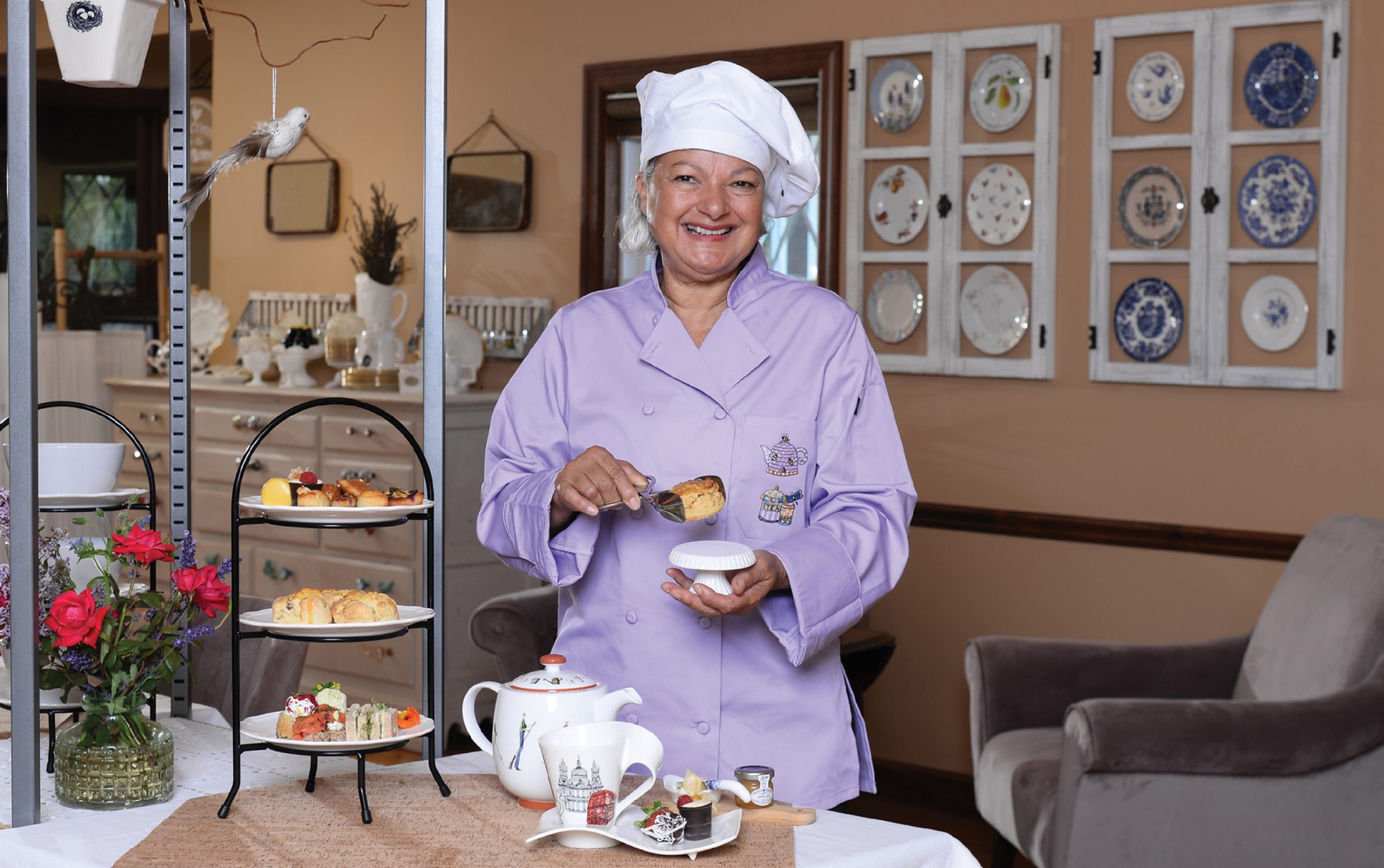Penelope Woodhouse’s cup of tea is, well, afternoon tea. Originally from England, she’s happy to share her interest with people in her new home. At Botanical Tea Room in Augusta, she offers guests an unique experience—one that is steeped in tradition and history but also keeps modern sustainable practices at the forefront.
Growing up in England, Woodhouse always had an interest in the culinary arts—whether it be cooking or growing food and edible flowers. However, she never imagined she would have a culinary career. Instead, she found success through a different creative outlet: fashion. “My career was in fashion merchandising,” she says. “I designed store windows and displays. I connect it to cooking and gardening through the visual component. Plating a dish and designing a garden are all about color, texture and proportion. It’s really not that different from creating a window display.”
After moving to the U.S, Woodhouse found that her accent brought up certain questions from people, especially about tea and baking. “I would meet people at farmers markets, and they would ask me about the British baking shows,” she recalls. “From there, I started inviting people over for afternoon tea. The feedback was always positive.” Eventually, Woodhouse decided to try her hand at opening a tea room. Due to her love of gardening, she decided to make the focus on afternoon tea with a botanical twist. “I didn’t see myself as a baker,” she notes. “I’m a culinary herb grower. I love to infuse botanical flavors and aromas into food.”
Woodhouse and her husband, Dennis, opened Botanical Tea Room on a 76-acre sustainable farm in St. James. She started by cooking her way through afternoon tea cookbooks from around the world and experimenting with ways to infuse botanicals into recipes. Since its inception, the tea room has had a focus on sustainability and eco-friendly practices, such as preserving biodiversity in heirloom foods, creating menus that are pollinator friendly and finding ways to keep food prep zero waste. “We grow many of our ingredients, and source others from local producers who use sustainable practices,” Woodhouse says.
Botanical Tea Room enjoyed success in St. James, but the Woodhouses found the location to be a little isolated. They made the decision to relocate to Augusta in 2019. “The farm was an ambitious landscape for us to maintain,” she notes. “With its rolling hills, wineries and historic buildings, Augusta was the perfect fit for us. Plus, it is more accessible to St. Louis, where we’ve always had a home. We still get to be a part of the rural landscape while enjoying the amenities of the city, such as the botanical garden.” The Augusta location continues Woodhouse’s dedication to sustainability. One acre of the two-acre property is dedicated to growing wild native edibles.
While 2020 should have been an exciting time of growth for Botanical Tea Room, the pandemic threw a wrench into plans. With the hospitality industry hit hard, Woodhouse knew she needed to pivot. Her solution was bringing in a focus on the historical importance of tea rooms and their traditions. It was a natural fit since Botanical Tea Room already recreated many historical recipes. Woodhouse established a nonprofit, the Tea Room Society, dedicated to sharing that culinary and cultural history. “In America, tea rooms were started by women in their homes as a first step toward entrepreneurship,” she says. “They made a huge financial contribution to the rural economic landscape. We are following in that homesteader tradition. We want to create an educational experience through a piece of living history for our guests.”
Woodhouse is excited to see what the future holds for Botanical Tea Room and the Tea Room Society. One project currently underway is creating a cookbook library. “The Joy of Cooking actually originated in St. Louis,” she notes. “Researching and exploring has really shown me the role cookbooks play in our everyday life. They make and preserve food trends—who didn’t have one centered on canapes or fondue? We want to create a resource where people can exchange and share food history.”
Woodhouse is currently a student in St. Louis Community College’s culinary program. She’s looking forward to being able to share her kitchen with other participants and graduates. “I want to give them an opportunity to create something special at Botanical Tea Room for themselves,” she notes. “Augusta has a wonderful audience to support the hospitality community we are trying to establish. My culinary journey is just beginning.”
The Augusta Scone
Yield: 6 scones
Oven: 350°F
ingredients
5.75 oz. all purpose flour, extra for dusting
1 oz. fine sugar (optional)
¾ tbsp. baking powder
⅛ tsp. finely ground sea salt
2 oz. cold unsalted butter
1 ¼ oz. raisin mix
3 oz. milk (Note: You can botanically infuse the milk by adding lemon verbena tea mix.)
directions
- In a large bowl, sift dry ingredients. Add butter and rub together to form a fine texture crumb.
- Stir in raisins. Slowly mix in wet ingredients.
- On a lightly floured surface, roll out the dough to form a circle, and cut six scones or score into triangles.
- Transfer to a baking tray, and gently brush tops of scones with egg wash. Let scones sit for about 20 to 30 minutes to allow baking powder to activate.
- Bake until evenly golden, around 10 to 15 minutes. Scones are best enjoyed the day of baking, but can be frozen.
Photos: Bill Barrett









